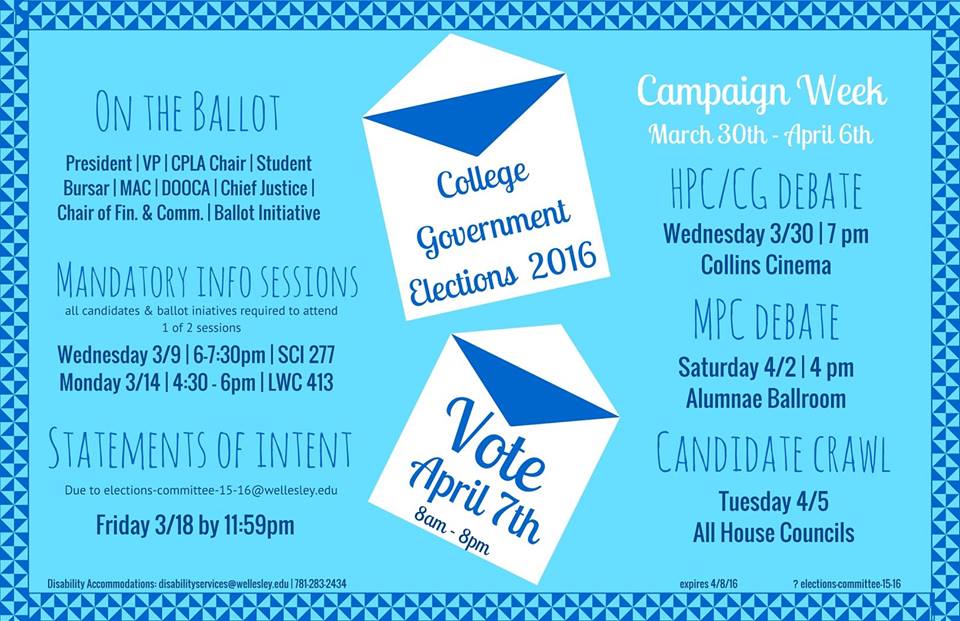Dear Wellesley community,
We as Elections Committee (EC) are writing this statement as a way of shedding light on this year’s decision-making process as it relates to our transitioning of one candidate from her position as a ballot candidate to that of a write-in for Chief Justice. Elections Committee (EC) is a varied group, composed of two elected Senate representatives, an elected representative from Multicultural Presidents’ Council, an elected representative from House Presidents’ Council, current CG Cabinet members not seeking re-election, as well as three students-at-large appointed through SOAC.
Last Friday, a candidate for the position of Chief Justice was removed from the ballot and asked to continue her campaign as a write-in. Due to widespread misinformation regarding the grounds for this candidate’s removal from the ballot as well as the process by which EC arrived at this decision, we would like to take the opportunity to clear up any confusion that might have arisen as well as explain what we believe was a thorough, thoughtful, and detailed consideration for how to approach a situation for which we had neither a precedent nor a satisfiable response whereby honest mistakes could be balanced with fair but firm outcomes.
First and foremost, we’d like to emphasize that write-in candidate Myra Ahmad’s transition into a write-in candidacy was a process that was given a great deal of care and thought: EC members spent a total of 9 hours over the course of two days between smaller group and larger committee meetings in deliberation over how to approach this particular case. We recognized that, given the importance that CG positions hold for both the candidates themselves as well as our overall student body, a balance needed to be struck between being sympathetic to individual campaign mistakes and situational contexts while also honoring process as well as the standards that are asked of each candidate as they have been laid out in our Elections Handbook. This handbook is public knowledge and can be found on the Google Site titled “2016 Elections Handbook”, which has also been distributed via our Elections Committee Facebook page.
Weeks before the start of Election Week, potential candidates were required by Elections Committee to attend a mandatory informational session in which this document was distributed in hard-copy and reviewed page-by-page by various members of EC. Among the bolded sections that were reviewed with candidates were violations of campaign guidelines and the election consequences that pertained to them. Elections Committee, in reviewing this section, took care to emphasize to potential candidates that the actions of their team members would also be considered by EC as actions that reflected on themselves as candidates.
One particular campaign violation that was reviewed during this meeting is referred to as active campaigning. Active campaigning for all candidates is strictly forbidden before 8am on Day 1 of election week and following 11:59pm on Day 7. It is defined as any action that is taken by a candidate or their campaign team member to solicit votes from the student body; this includes but is not limited to chalking, distributing posters, or publishing messages or pages on social media announcing someone’s candidacy and asking students to vote for them.
Per the rules listed in the Elections Handbook, actively campaigning before the designated time could be construed as a violation of the tone and spirit of election week (and potentially a Tier 2 violation warranting removal from the ballot).
On March 30 (the first day of campaign week) at 7:45am, it was noted by several members of EC that Myra’s team had violated this rule by chalking and postering in the Science Center and residential Quint. Though it was clear that this action constituted a removal from the ballot, Elections Committee had no precedent for deciding whether Myra should be permitted to continue participating in the EC debates and candidate crawl or whether her removal from the ballot constituted removal from EC programming altogether. Given conflicting class schedules, with various EC members off-campus and in class until 4:45pm, the earliest joint meeting that could be convened (and that would fulfill quorum for a vote to be passed) was 5pm. It was subsequently decided at 6pm in a 5-4 vote, with the co-Chairs as non-voting members presiding over the meeting, that Myra should be removed from the ballot but allowed to continue participating in Election Week programming. An email was then drafted and sent out at 6:21pm alerting Myra to this decision with an apology and explanation for why the decision could not be reached sooner.
The co-Chairs of EC met with Myra and a few of her team members that evening ten minutes prior to the HPC-CG debate and were informed by them that the campaign violation that had resulted in Myra’s removal from the ballot had been unintentionally committed. Myra stated that two members of her campaign team had went against her multiple instructions to not chalk and poster before 8am. In response, the co-Chairs of EC asked Myra and her team to send them copies of Myra’s emails and also asked that the two individuals responsible for the violation contact them as well to explain the situation. Though the co-Chairs could not promise that this would be enough to reverse the EC vote to remove Myra from the ballot, they instructed Myra and her team to wait until the following day to hear word from the committee regarding their decision in the event that a new one was reached.
After receiving the requested emails from Myra and her team members later that night, the co-Chairs of EC convened a series of 5 ad hoc meetings that evening and the following day between themselves and sub-groups of EC members to address the situation in as timely a manner as possible. This structure was also used to work around conflicting class and work schedules that prevented the committee from reaching quorum in a single setting where a new vote needed to be cast.
The co-Chairs also took care to consult the current Chief Justice, who, per CG Constitution, was required to be an impartial third-party overseer of EC to ensure its practices abided by the honor code. Although one of the previous interpretations of the distributed Elections Handbook was that active campaigning before the permitted date and time violated the tone and spirit of elections (for fairness to all candidates), some members of the committee did not agree that this could be enough to warrant removing a candidate permanently from the ballot if there had been no malicious intent to disregard the rules set forth by EC.
Ultimately, it was decided in a majority vote of 6-4, with the co-Chairs of the committee acting as non-voting meeting participants, that good faith should be assumed and that Myra’s ability to be included on the ballot for Chief Justice should not be denied due to a mistake made by her two team members, who disregarded her instructions. In deciding next steps, EC sought to find a middle ground between being forgiving of mistakes and communication breakdowns between candidates and their team members while also making sure that all candidates were being fairly held to a firm standard of honoring the behavior required of them in the distributed handbook.
In considering the newly submitted materials from Myra’s team members, EC could not identify malicious intent to violate campaign rules and, instead, found the actions of her campaign team to fall more within a continuum between a Tier 1 and Tier 2 violations. And so, in responding to her failure to abide by active campaigning rules (a violation that no other candidate team had committed), EC sought to thoughtfully develop a series of required conditions that could convey the seriousness of what had happened; acknowledge that traditionally, our rules afforded no space for candidates to be reinstated; but also convey that EC was willing to give benefit of the doubt and assume good faith in a productive way rather than through sheer punishment. We hoped this would be firm enough to serve as an educational opportunity for why community process mattered so much, particularly for CG Cabinet positions, while also ensuring that the repercussions for the violation were not so final that Myra would lose her chance to be included on the ballot.
It was determined that Myra would need to fulfill three requirements in order to be reinstated on the ballot. This was a decision through which EC was setting a new precedent in recognizing the special circumstances that led to Myra’s campaign violation, in recognizing the materials that were submitted by her team, but also in recognizing the seriousness of her campaign violation and seeking to uphold fairness for the other candidates in our response to it if we were to allow her to continue on the ballot.
- Myra and her submitted 10-person team, in addition to the two non-core team members who committed the original violation, were invited to a mandatory meeting with the co-Chairs of EC. This was originally scheduled for the next day at 12:30pm but was later amended to 8:00am due to the Jummah prayers that many of Myra’s team members would be participating in that day and that EC wanted to respect. As it had been clear that a campaign violation had arisen from a breakdown in communication (where EC’s rules had failed to reach every team member via the candidate), the co-Chairs wanted to provide a space where questions could be answered and rules clarified in such a way whereby this sort of miscommunication could not happen again. It was necessary that this meeting occur with all Myra’s listed team members and that the team understand that failure to have such a meeting and ensure that everyone knew the rules going forward would result in a removal from the ballot.
- Myra and her team were asked to correct her already distributed spam to satisfy the rules stipulated by college policy as they were written in the Elections Handbook. As the earlier violation of active campaigning had seemingly resulted from a communication breakdown, EC wanted to give Myra a second and final opportunity to demonstrate her team’s ability to demonstrate care for college policy and EC rules as they were listed in the Handbook. The deadline was set for Friday at 12:30pm for all paper spam to be corrected by the rules that were listed in the final 4 pages of the document.
- Finally, Myra was asked to attend a non-punitive, conversational meeting with Don Leach (the administrative director for the Honor Code), the Chief Justice, and the co-Chairs of EC to highlight, the importance of honoring rules and process, particularly for the position of Chief Justice, whereby so many cases for honor code hearings cannot be heard if an exact process is not honored.
It’s important to note that although Myra and her team successfully fulfilled the first listed condition, her corrected spam ultimately did not satisfy the college-wide policies noted in the handbook for disability accommodations, whereby the exact line that needed to be included was available in the document to be copied and pasted into candidates’ spam. It was also noted by a member of EC that Myra’s spam had been inappropriately postered on a board that had not been designated as a pre-approved spamming location in the handbook for Bates Hall. Unfortunately, these two mistakes, coupled with her incorrect expiration dates on some of her remaining spam as well as violation of Science Center postering policy, demonstrated her inability to fulfill the second condition for her reinstatement (as had been reviewed and agreed upon in her and her team’s morning meeting with EC). As a result, she was finally removed from the ballot.
We hope this letter illuminates the carefully considered process that EC developed to address a situational context for which we had no precedent yet also believed immediate removal from the ballot did not satisfiably address. If there are any further questions regarding Elections Committee or the upcoming candidate crawl and voting dates, please do not hesitate to e-mail us at [email protected].
Sincerely,
Elections Committee ’16
Adeline Lee & Meredith Ausenbaugh, co-Chairs
Rene Chan
Isabelle van de Walle
Ananya Ghemawat
Meredith Berry-Toon
Jessica Shin
Tyler Duerson
Alix Lewis
Sam Lanevi
Maggie Neel
Ali Robinson
Catherine Woodhouse
Sophia Leung






